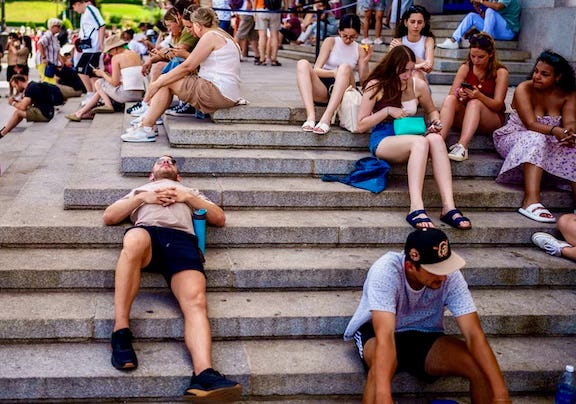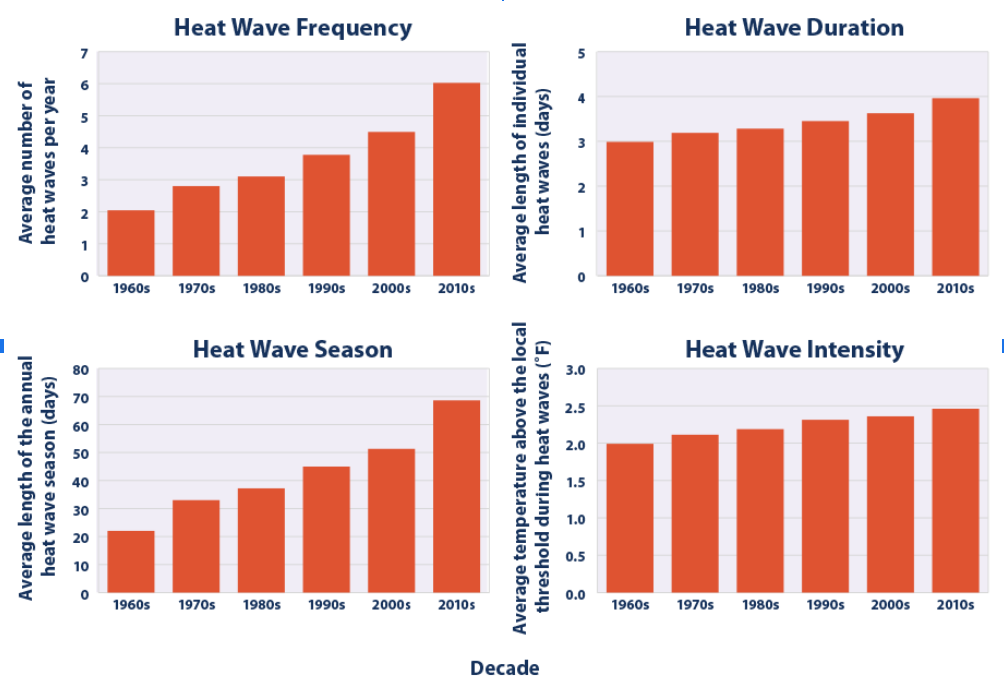The recent heatwave where I live in Canada has lasted 8 consecutive days with temperatures ranging from 34C to 42C, with humidity included. And half of those days, wildfire smoke has made the air hazardous to breathe.
I’d be in the hospital or perhaps worse without access to air conditioning.
I’m serious.
Over the years, I’ve suffered from heat exhaustion several times and even required medical treatment.
I like heat, but it doesn’t like me.
I was born in Canada, a formerly cold country. My genetic heritage also comes from cool/cold countries, such as Scotland and Ireland.
Aging has increased my vulnerability to heat, as it does to all of us. (Reduced sweating capacity, lowered ability to dissipate heat, poorer core temperature regulation, etc.)
This week is the first time I truly realized that a climate-change-enhanced weather event could kill me. It might have happened this week without A/C.
I’ve written over 100 articles documenting the science on how climate change is super-charging extreme weather events, such as increasing the severity of heatwaves, floods, storms, droughts, etc. This is well-documented science now. (Tons of my articles on the topic are here. Or just search NtK, there’s a dozen or so.)
Today, it feels personal.
Climate change is directly impairing the quality of my life. It’s a direct threat to my health and survival. People have no doubt died prematurely this past week because of the current heatwave.
Human-caused climate change was responsible for killing about 1,500 people during Europe’s most recent heat wave, according to a new attribution study. Attribution science can now determine how much a particular event, such as a heatwave, was enhanced by our warming climate and how this warming increased the likelihood of such an event occurring.
Thousands more people have died in other heatwaves in other countries this year.
I now realize at a gut level that climate change could have seriously harmed me this week. My feelings this week have ranged from feeling vulnerable and helpless to frustration.
We all need to realize that some climate-amped storm or extreme weather event could kill us today or tomorrow.
This is not some far-off threat.
The dangers posed by climate change are personal and immediate.
Is climate change trying to kill me—or you?
Maybe not, but it certainly could.
And the odds of some aspect of climate change killing or hurting you or one of your loved ones go up with every ton of CO2 we add to the atmosphere
That’s the grim situation we’ve put ourselves in.
Here’s what you and I can do about it, starting with the most impactful according to Project Drawdown.
Cut food waste – Buy only the food you know you’ll eat
Eat more veggies – Replace some of your meat with healthy protein-rich plants
Switch to clean energy – Upgrade to renewable energy in your home
Insulate your home – Improve your home’s window and wall insulation
Save with LED lights – Switch to energy-efficient LED light bulbs
Heat & cool smarter – Install heat pumps or smart thermostats
Get solar – Invest in solar panels and solar hot water
Get around greener – Share a ride with others or travel by bike, public transit, or foot
Drive electric or hybrid – Make your next car an electric or hybrid vehicle
Fly less – Stay local, make a video call, or find another way to travel
Reduce & recycle – Avoid single-use plastic and recycle right
Don’t discount the ripple effect of your actions. Engaging in any of these can impact the behavior of others. For example, reducing your meat consumption signals to your grocery store and food producers that people want less high-emitting meat and dairy production, and more healthy plant-based options.
There are many more ways to reduce emissions. Our ability to make a difference really grows when we work together with others.
Until next time, stay cool and be safe.
Stephen




Those 1500 people died because they couldn't afford their electricity bill. They didn't die because it's hot outside. https://teslaleaks.com/f/weather-wars-w-haarp-project-invisibility-projected-kinetics